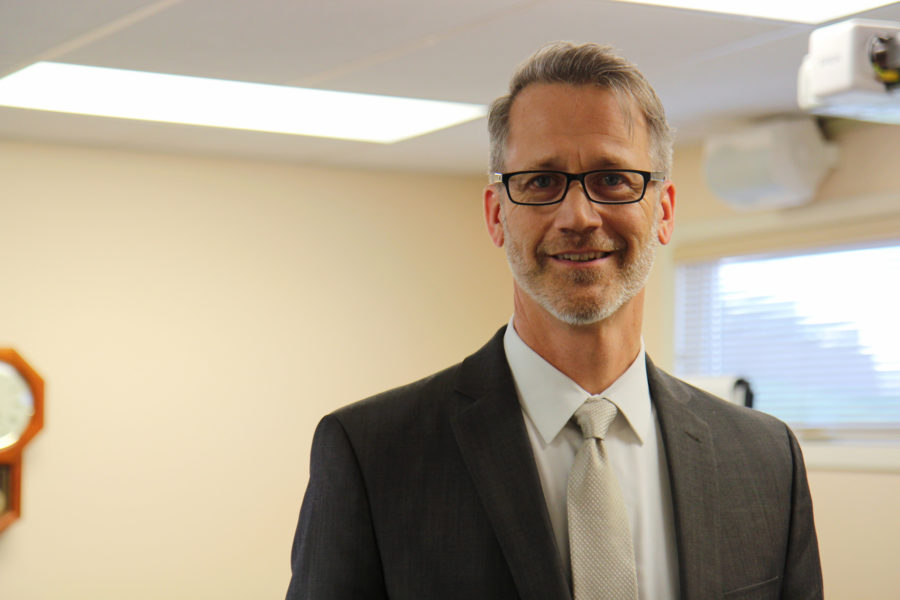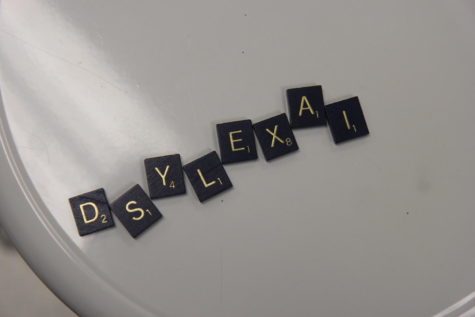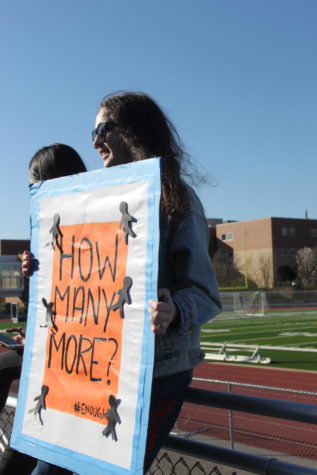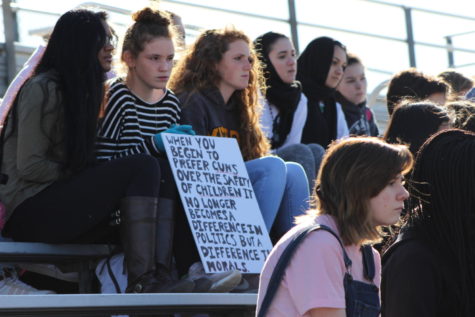Q&A: Dr. Eric Knost on Proposition-T
Media by Abhijit Srirangam
Rockwood superintendent Dr. Eric Knost is currently voicing support for the upcoming Prop-T bond issue. Voting will be on April 4.
Q: What is Prop-T?
The biggest intent with Prop-T is the fact that we have 2,300 homes being built in the Rockwood School District. They’re either being built right now or are being slated to be built in these rather large subdivisions — the vast majority of them are in the Eureka area but we don’t have room to add the number of students those homes will produce into our schools and still maintain our class sizes. We’ve been driving class sizes down and if we do nothing with space, class sizes will be going up. We should also reconsider the boundaries of our schools — possibly even redistrict. Some people think [redistricting] is not a big deal and that we do it once in awhile. We do it in individual areas but this would be something that we will potentially do district-wide which means that the high schools that some attend may need to change. It’s really about our attempt to create more space and we’re combining that with advancing our efforts at innovative, STEM education. For instance, at MHS, with the last bond issue, we are building the addition onto the science wing. Prop-T will allow us to come to the existing science area and renovate those rooms to the space that’s needed by the teachers and Dr. Mathison. We’re combing those two things to create Proposition-T.
Q: Does this lead to new technology being put into the STEM programs?
There are a couple things with technology on there. You may be aware that we are slowly ramping up a one to one student to computer ratio in the district. This year, all of our 6th-grade students have them. Next year, they’ll continue to have them in seventh grade and sixth grade will get them again. Next year, all ninth-graders will get them as well. Prop-T allows us to continue funding that and expanding that for the next few years. Ultimately, it will get us to a one to one ratio in all of the secondary schools. We’re not sure what we want to do with elementary yet. We probably wouldn’t do one to one, for instance, with kindergarteners, but we may do it in 5th-grade to prepare them for middle school. Prop-T should be sufficient for that effort. The other thing with technology is that we start teaching STEM-like curriculum from early childhood. We’re also, with the bond issue, going to equip spaces at all of the elementary schools where we’re going to add some special equipment that we can let be resources — for any grade level — to let students practice 3D programming with a 3D printer. We’re not going to add so much stuff to the point where they’re overwhelmed with it. We want teachers to feel that this is a resource, not something we are forcing on them. There’s an example room that a PTO created at Pond Elementary School and it’s been going really well with staff. That’s the equipment portion of it that’s actually a pretty small amount overall. The rest of it is really spaces and the equipment we need in those spaces. When we create a STEM lab in a high school, we need equipment to outfit the lab as well: furniture, casing, etc…
Q: How do the board elections affect how Prop-T is going to go over if it does at all?
I think you need to zoom out a little bit: board elections often mirror the trust in the school district or how calm things are — that people know they are in good hands, that they’re in good leadership. We are so fiscally sound in how we operate. Sometimes when things aren’t so great, you have a lot of reform mentality — coming out and running for the board — because they want to get out and change things. We don’t have right now. All of the candidates running for the board are supportive of what we’re doing and want to see the district go in this innovative direction that we’ve been going in. They want to support that, they want to see these spaces, they want to see our class sizes down. In this particular case, I don’t think that one really impacts the other because as far as I know, all of those running are supportive of the current mission vision and this current proposition. I think it’s going to happen simultaneously. Whoever the three coming on are going to get elected the same day Prop-T passes or fails. I don’t think the two, in this care, are inter-related other than by saying that there’s support from all of these candidates.
Q: Where does the money go in terms of the percentages?
There’s a lot of cross-over. We’re specifically building a brand new Eureka Elementary School and we’re specifically adding on classrooms to Geggie and that’s the chunk for new space. But that’s not necessarily true. There are 2,300 students at MHS. That’s a ton. It’s a big building but it’s, in some ways, a little too close for comfort. By expanding the wing we’re already doing, that not only creates additional area for science, which will be on the third floor, but also more classrooms on the second floor. The same thing is what we’re dealing with Eureka High School — an addition and renovation. Wildwood Middle School, the only middle school in the whole district that doesn’t have a second P.E. space, will see change too. It’s just a little challenging because there’s a crossover. We’ve tried to create a pie chart but we realized that they have to overlap — we have to tell a story that some of that is both STEM and enrollment.
Q: With the new space, is that going to mean more teachers for already existing science classes or new classes?
That really depends on what students are interested in and our ability. At MHS, you see teachers wheeling around carts. That should not be happening.
Q: How will these changes affect Marquette specifically?
It’s specifically about coming back in and renovating the existing classrooms after we have new classrooms in the ongoing expansion. The other thing is, I’ll give an example, the last three years I’ve done a lot to try to impact class sizes. When I came to the district, we had first, second and third-grade classes where it was not uncommon to see 25 kids in the class because the state allows that. Now, you’re more likely to see 20 and we’re trying to get it to more like 17 and [not passing the bond issue] would send it the other way. It affects all those elementary schools and because you can’t absorb 2,300 homes and not have it ripple throughout the district in some way. Right now, Rockwood Summit comes all the way out to Crescent Farms, which is almost in Eureka, so we may actually get to the point where we may actually have to start inching into Eureka and take kids to Rockwood Summit. Or it could work around the horn, so to speak, because if we start sending kids more to Lafayette then we may have to send more kids that are currently at Lafayette over to Marquette and there are areas of Marquette over by Selvidge — it’s as close to Rockwood Summit as it is to Marquette so maybe that has to funnel down to Summit. That’s what we’re trying to avoid.
Q: What about hiring teachers?
When it comes to staffing, which affects class sizes in the secondary schools and especially in the high schools, what Rockwood used to do that I stopped, is Rockwood used to have a formula. Every year, they would forecast the number of students that are going to be at Marquette High School, for example, in the next year. They’d use all kinds of cold hard survivorship data and the average daily attendance and all this kind of stuff and they’d calculated in a formula. If that formula said that Marquette High School should have “x” number of teachers, whatever that may be, if that was fewer than what you currently have, then Rockwood would go to Dr. Mathison and say ‘You’ve got to cut 3.5 teachers.’ Next year, if you’re projected more, you get more back. It was this roller coaster thing. Now, when we need more teachers, we’re gonna add them. When we need less, we’re not taking any away. So that spreads class sizes out. There are no cuts made to staff in any of our high schools this year and that’s probably the first time in Marquette history. That’s what we want to keep doing and that has a direct impact on Marquette. There’s a common language that if you’re a parent, a student, or an educator, everybody agrees that good teachers and the lowest possible class sizes are the best remedies for success.
Q: If Prop T doesn’t get passed, how would you look forward?
This isn’t a tax levy so we’re not raising the tax rate, and this isn’t money for salaries or anything like that. This is bricks and mortar, and equipment to fill those bricks and mortar. We’re able to do it because we’re in such good financial shape. It’s common for school districts to really kind of paint a doom and gloom scenario and, basically, go out and tell the community the sky is falling and if you don’t come out and do this our districts gonna stink. I think that if you have a superintendent who’s willing to do that, then you need to get a new superintendent because it’s my job to take what the community says so we can have and create the best possible school district. If it doesn’t pass on April 4, on April 5 Rockwood is still a great school district. We’ll face some challenges with class sizes. We’ll have some of those that are back up near 25 in elementary schools and we’ll probably be looking at a redistricting effort district wide. But we’ll still be good. We’ll still be quality and we’ll still have high rankings and we’ll still have great success with students. But I’m hopeful. I’ve been out talking to civic groups, to our local government affair groups, and, of course, parents and PTO’s and the feedback is predominantly good. I think we have a good trust factor in the district. We spent three years building trust with people with our stewardship. You made the comment earlier, 95.5 million that’s a lot of money, it really is, but you have to keep some perspective about how we handle our finances in Rockwood. First of all, I made a deal with the board coming in. This was my idea, and the board said they liked it. I said that first of all, we’re never going to pass a budget, an annual budget, that deficit spends we’re going to balance our budgets every year. If our balances get to a point where we think they’ve built up a little too much, and we want to make some intentional purchases out of those, that’s a different story, but we’re going to balance budgets every year. We’ve had balanced budgets every year, we’ve made decisions like bringing transportation in-house. You guys know that we now have Rockwood buses. By doing that, we save the cost that it would’ve been to stick with our contract services, which we did bid, they were the lowest bid, but we are saving half a million dollars every year, and we will, perpetually, forever. The district used to use construction management and now, we use no construction management. That’s an outside service coming in that you hired to be an owner’s representative and to manage all of the projects. We did that all in-house which saved us 4.6 million dollars. We are going to do the same thing with this bond issue which will save us over 6 million dollars there. We’ve really practiced fiscal stewardship. The other thing we do is our tax rate that is assessed on your homes, 68 cents of that tax rate, pays our debt service. Meaning whatever debt we have, whatever bonds we have, that 68 cents is dedicated to that. That allows us to expire at least 25 million dollars each year in debt. In my time here, we have expired over 75 million dollars in debt and we are on a fast path to aggressively tackle our debt, in fact, even with Proposition T, we will pay down the vast majority of our debt in ten years. This isn’t like, we’re taking this out and we’re going to be in shock up to our eyeballs for decades. In fact, in ten years, that 68 cents needed will drop to only 14 cents to deal with the remainder of our debt. But because we are so aggressive with paying down on our debt and we’re well below the statutory limit for a public entity’s bond indebtedness, we don’t have to do this — we don’t have to go to the voters and say, we need 95.5 million and it also means that your tax rate has to go up by 25 cents. We don’t have to change that tax rate. We’re well within our structure to just as I was talking: 10 years of paying aggressive debt and it keeps us in really good shape.
Q: What happens after you pay that debt? Where does the rest of the money go?
The only thing I left out in the bond issue is a fair share of what we call cycle maintenance. Things wear down, roofs wear down, parking lots, flooring, heating, ventilation, air conditioning… those systems wear down over time, so you have to have money dedicated to that. We’re paying for those things out of bond issues. When we get ten years to where we no longer need 68 cents to deal with our debt, we can stay at 68 cents, and aggressively pay off the remainder of our debt, but there’s no need to do that, we can take that down to 14 cents. This is not new money, it’s just asking the voters to move 54 cents of that 68 cents over into our operating budget, and then we have what’s called a dedicated levy, which means every year we generate money in the operating fund to take care of our roofs, to take care of our parking lots, to take care of HVAC, to take care of flooring. It’d be a good enough dedicated levy where we could take care of additions to buildings potentially, probably not the equivalent of the addition to Marquette, but like Geggie, we could take care of that. The only thing it wouldn’t cover would be new schools. That’s where our bond issue would come in. But here’s the good news: Rockwood really can’t grow all that much more. The reason most of that growth is happening in Eureka is because there’s no longer farmland in West County like there was. When I taught in Rockwood in 1989 and in the 90’s, there were little farms selling off and neighborhoods popping up all over the place, and that’s happening in Eureka because there are some families that are getting older and are saying ‘We don’t really need 25 acres anymore.’ There’s only so much land to go around, so I don’t expect that we’re gonna be needing to build a bunch of additional schools in the future. In ten years, the idea is to ask the voters to let us move 54 of that 68 cents over into operating. That keeps us from having to come back for additional bond issues.
Your donation will support the student journalists of Marquette High School. Your contribution will allow us to purchase equipment and cover our annual website hosting costs. You may become a PATRON by making a donation at one of these levels: White/$30, Green/$50, Blue/$100. Patron names will be published in the print newsmagazine, on the website and once per quarter on our social media accounts.

Neelansh will be spending his senior year as the Online Editor in Chief of the Marquette Messenger. He joined newspaper because of a passion for writing...
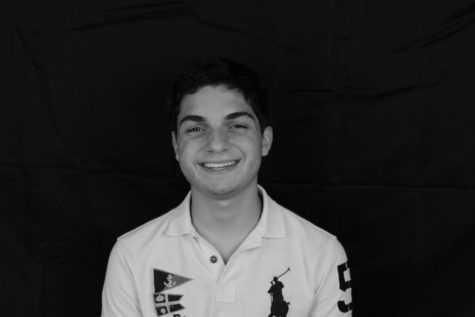
Greg Svirnovskiy, senior, is the Editor in Chief for the Messenger. Greg is passionate about the subjects of journalism and history. He is currently also...



